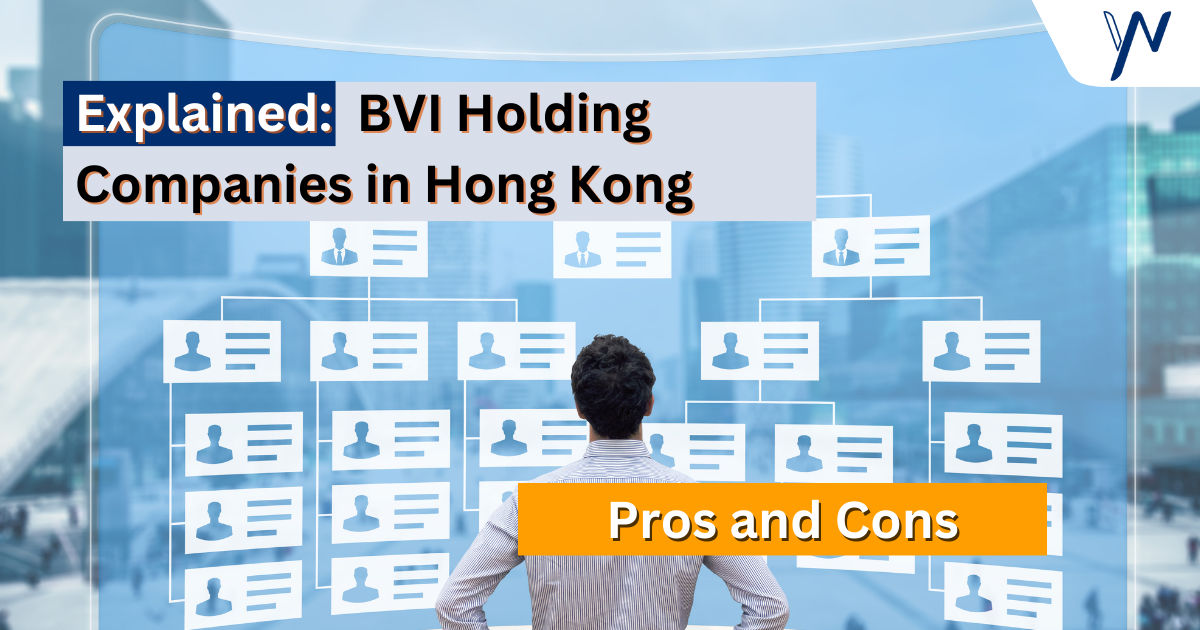The British Virgin Islands (or BVI for short) is one of the top jurisdictions for businesses to set up their offshore holding companies, and Hong Kong businesses are no different, with over half of all companies listed on the Hong Kong Stock Exchange are offshore companies registered in the BVI or the Cayman Islands.
Whether your company should setup a BVI company depends on the needs and goals of your business, as while there are strong advantages of using a BVI company, it comes with costs and problems that may not be worth the trouble for your company. To understand better, let’s first go over the advantages of using a BVI company for a Hong Kong company.
Advantages of Using a BVI company
Flexible Corporate Structure
BVI company law is designed to be extremely business friendly in the form of the BVI Business Companies Act, which provides a high level of flexibility for company structures, share capital, and articles.
If for example, Company A acquires Company B, Company B’s corporate structure would need to be adjusted to suit Company A. Different classes of shares with varying rights can also be easily created for shareholders of Company B upon getting acquired by Company A.
Privacy and Confidentiality
BVI holding companies provide a layer of confidentiality to the corporate structure of a Hong Kong company, where disclosure of the company’s corporate structure is only required to be submitted to the BVI government, and is not publicly available. Furthermore, the BVI allows for nominee directors and nominee shareholders to be nominated anonymously.
Stamp Duty on Transfer of Shares
If a buyer wishes to purchase shares of a Hong Kong company, they would need to pay Stamp Duty taxes when said shares are transferred. Instead, if the Hong Kong company is held by a BVI company, the buyer can instead buy shares of the holding company without having to pay stamp duty on the transfer of BVI shares.
Cross-border Mergers and Acquisitions
The lack of restrictions on foreign ownership of BVI holding companies, and the neutrality of the island chain facilitates corporate transactions across the world, allowing multi-national companies to merger with and or acquire other large companies without having to deal with restrictions in their home locales that may make such transactions too costly or impossible to perform.
Disadvantages of Using a BVI company
Increased scrutiny and Reputation Risks
While a lack of public exposure to a BVI company’s structure may increase confidentiality and privacy, its opaque structure may invite increased scrutiny from the public from the potential to abuse its position, and can create issues of trust between the company and other banks, business partners and regulators in other countries.
Difficulty Opening a Bank Account
If the sole purpose of the BVI Company serves as a holding company that passively holds shares of a Hong Kong company, the BVI Company may not need a bank account. However, if the need for a business bank account were to arise for the BVI Company, then opening one would prove difficult, as there are several requirements a BVI must meet as a technically foreign entity.
One such requirement that banks in Hong Kong have for BVI holding companies opening a bank account in Hong Kong is that the BVI company must first obtain a Hong Kong business registration certificate, which means they must disclose their company structure to the Hong Kong Companies Registry as well as to the bank they wish to open an account with.
In the past, BVI companies would also need to send an authoritative company representative to the bank to open a bank account, but thanks to new virtual verification processes, opening bank accounts can be performed remotely.
Accumulating Operational Costs
Maintaining a BVI company structure in addition to the core company means handling more administrative, legal and compliance requirements, which adds up financially over time. Such fees include items like:
- Annual renewal fees
- Annual government license fees
- Annual agent fees
- Economic substance fees
- BVI Agent KYC fees
- Fees for obtaining a certificate of incumbency
Increasing Compliance Requirements
The level of scrutiny against BVI companies has increased in the past few years, where the Organization for Economic Co-operation and Development, or OECD, has pressured the BVI government to increase compliance requirements on BVI companies to combat money laundering and tax evasion. Some of these new requirements have become headaches for new and existing BVI companies. Such requirements include items such as:
An Economic Substance Declaration
The Economic Substance Act of 2019 requires BVI companies to maintain “economic substance” in the BVI to have tax residency. Economic substance is defined as:
- Business activities and revenue generating activities are conducted and managed in the BVI
- An adequate number of staff situated in the BVI
- An adequate level of expenses are being incurred in the BVI
- The company has a business address in the BVI
How does this affect BVI holding companies for Hong Kong companies?
If a BVI company’s sole purpose is to hold shares of a Hong Kong company, then the BVI company would file its economic substance status as a “Passive Pure Equity Holding Company”.
As a passive pure equity holding company, the BVI company can establish economic substance in the BVI without active management. Meaning, that the holding company can claim tax residency in the BVI as long as the company has a registered agent and registered office address in the BVI jurisdiction
Submission of Financial Annual Returns
As of 2024, BVI companies are required to submit financial annual returns to their registered agents in the BVI each year. The annual returns consist of a simple balance sheet and profit and loss sheet.
BVI Companies must submit the financial annual returns within nine months after the end date of their financial year. For example:
- If your company’s financial year ends on December 31, 2023, then the financial annual return must be submitted no later than September 30, 2024.
- Similarly, if your company’s financial year ends on March 31, 2023, then the financial annual return must be submitted no later than December 31, 2024.
Certain companies that meet one or more of the following requirements are exempted from submitting financial annual returns:
- Publicly listed companies
- Companies that already submit financial annual returns under the BVI financial services legislation
- Companies that already submit financial annual returns and financial statements when it files taxes with the BVI IRD
- Companies currently being liquidated
What Hong Kong companies are suited to having a BVI company?
For most small and straightforward businesses operating locally in Hong Kong expecting modest growth, the benefits of using a BVI company are limited and will likely be more trouble than it’s worth. Companies that are more likely to benefit from a BVI company are usually businesses that have expanded internationally and at such a scale that a BVI company is necessary to manage or transfer their assets internationally.
Companies of this nature usually take one or more of the following forms:
- Multinational corporations with subsidiaries or investments in multiple countries
- Private equity firms, venture capital funds, and other investment vehicles
- Family offices and high networth individuals managing their global assets
- Companies involved in cross-border mergers, acquisitions, and joint ventures
Want to start a BVI company?
If you think your business could use a BVI company to its advantage and want help setting it up, or if you simply have more questions about the requirements, get in touch with us.










